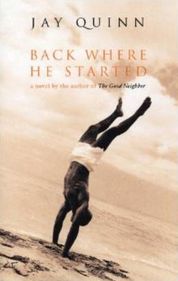A WRITER'S WIT
Poets lose half the praise they should
have got,
Could it be known what they
discreetly blot.
Edmund Waller
Born March 3, 1606
My Book World

Even though this book has been out for over a decade, it still speaks to gay people of today, particularly those seeking to marry. Perhaps it has even led the way.
Forty-eight-year-old Chris Thayer has spent twenty-two years married to a man who comes to the relationship as a widower with three children. Now that man has decided that he is bisexual and is positioned to dump Chris and really marry a real woman.
The novel then proceeds to show how Chris establishes a new life apart from his husband and children, who affectionately call him “Mom.” In the kind of legal agreement that can probably only take place in fiction, Chris receives a healthy monetary settlement without having to go to court and decides to build a new life, replete with a small home by the ocean in North Carolina. Yet his children, the youngest of whom turns out to be a gay man, as well, are somewhat imprinted, can’t seem to do without Chris’s help; that’s how close he’s gotten to them in the time that he has been Mom. Chris, who has never worked outside the home, also very easily finds a job as a receptionist for a couple of shrinks—good money, flexible hours. Nice work, if you can get it. Chris then meets someone new, a man ten years his junior—such a contrast to the man he lived with so long, who was the older one. They fall in love and decide to build a life together, meshing their somewhat different lives together. Enough said about plot.
In some ways the book is ahead of its time. Only one or two states have adopted gay marriage at the time this book comes out, and so the novel seems prescient in one sense. On the other hand, all of us who write fiction should be wary of dwelling too much on electronic devices. No matter how up-to-date the device is in the novel, within a year, it’s going to be toast. In a decade it’s going to be a real anachronism. The only other weakness I can see in the novel is that some scenes are a bit “talky.” Dialogue is always important; it brings the lives of the characters alive, creates a certain bit of the novel’s fabric. But if it slows the narrative pace, if it sounds stilted, or worse yet, apes the words that the author finds cute or important, it’s going to read that way. Otherwise, Back Where He Started is a fine read, worth the time, even now, early in 2015.
NEXT TIME: NEW YORKER FICTION 2015
11/13/14 — Introduction to My Long-Playing Records
11/20/14 — "My Long-Playing Records" — The Story
11/27/14 — "A Certain Kind of Mischief"
12/04/14 — "Ghost Riders"
12/11/14 — "The Best Mud"
12/18/14 — "Handy to Some"
12/25/14 — "Blight"
01/01/15 — "A Gambler's Debt"
01/09/15 — "Tales of the Millerettes"
01/15/15 — "Men at Sea"
01/22/15 — "Basketball Is Not a Drug"
01/29/15 — "Engineer"
02/05/15 — "Snarked"
02/12/15 — "Killing Lorenzo"
02/19/15 — "The Age I Am Now"
02/26/15 — "Bathed in Pink"


 RSS Feed
RSS Feed